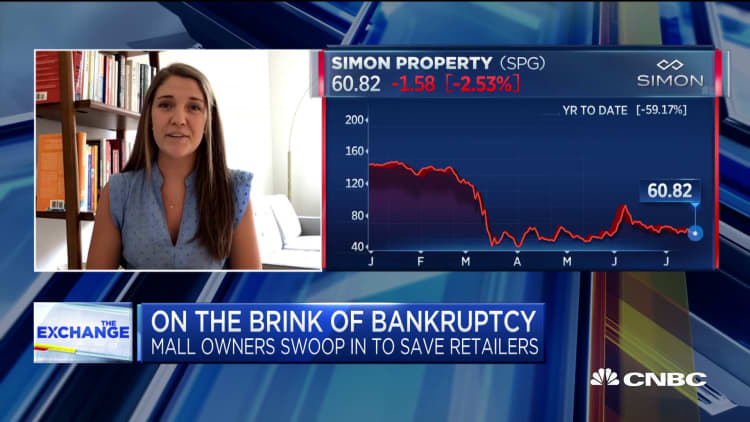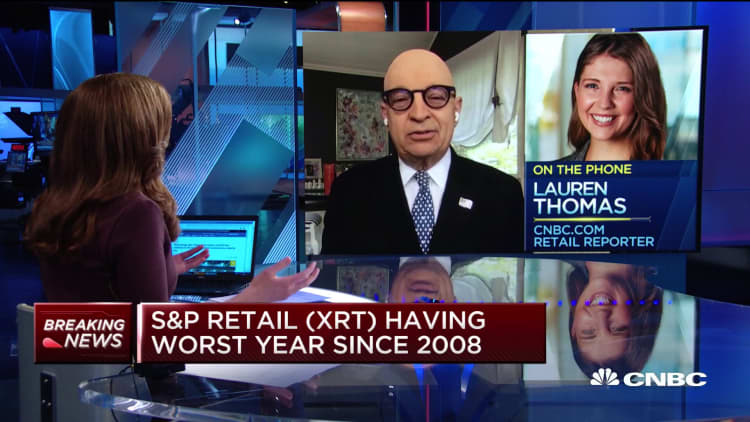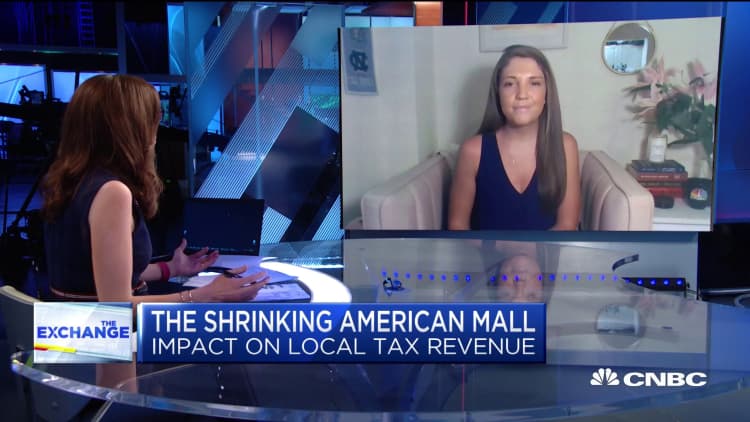
Dozens of retailers, some of them the lifeblood of America's shopping malls, have been pushed to the brink and filed for bankruptcy during the coronavirus pandemic.
Apparel brands like J.Crew, Brooks Brothers and New York & Co. parent company RTW Retailwinds. Department store chains Neiman Marcus, J.C. Penney and Stage Stores. The health chain GNC. The kitchen supplies company Sur la Table. The list goes on. And there are more coming.
Now, it's some of America's biggest mall owners that are increasingly looking to do deals to salvage them.
In many instances, as it plays out, these bankrupt retailers are major tenants in malls, with sprawling store counts. Meanwhile, some of the biggest retail real estate owners in the country, like Simon Property Group, are sitting on cash. A lot of it. On June 29, in an investor update, Simon said it had roughly $8.5 billion of liquidity on its balance sheet, including about $3.5 billion of cash on hand. It issued another $2 billion in senior secured notes on July 7.
In one of its latest deals, Simon, which is the biggest U.S. mall owner by the number of malls it operates, has teamed up with the apparel-licensing firm Authentic Brands Group to supply financing to carry Brooks Brothers through bankruptcy.
The $80 million loan from the duo that refers to itself as Sparc LLC (made up of Simon and ABG) comes, in a rare deal, with no interest or fees. However, the loan offer required the Brooks Brothers' branding and trademarks be used as collateral to the lenders. And so in the event of an entire Brooks Brothers liquidation, Sparc would keep the intellectual property, according to court documents.
Meantime, ABG and Simon have put up a stalking-horse bid of $191 million for the bankrupt denim maker Lucky Brand's assets. The duo has until July 27 to come up with funding, according to a court document.
And a trio of ABG, Simon and the mall owner Brookfield Properties have also explored acquiring department store chain Penney out of bankruptcy, CNBC previously reported. The three came together before to save the apparel chain Forever 21, which went bankrupt in September 2019, for $81 million.
The future of Penney is still up in the air, though. As of this week, the company continues to hash out a plan in court with its lenders to emerge from bankruptcy. It has pushed back a key deadline and now has until July 31 to evaluate potential buyers for its business, in a bid to attempt to avoid a complete liquidation.
ABG Chief Executive Jamie Salter told CNBC last month that he viewed Penney as a brand worth saving. He said the same about Brooks Brothers.
ABG already owns a slew of other once-defunct retailers including Barneys New York, Nautica, Nine West and Juicy Couture. Partnering with someone like Simon then adds expertise in real estate, in addition to brand licensing and apparel manufacturing, Salter said.
A representative from Simon did not respond to a request for comment.
'Acting like their own private-equity firms'
The Covid-19 pandemic, which temporarily forced malls across the country shut and continues to keep some of them dark, has clearly presented a very unique buying event for these landlords. Analysts say they're getting these deals on the cheap.
"I think this is an opportunity for the Simons of the world," said Scott Stuart, CEO of the Turnaround Management Association. "They're acting like their own private-equity firms. They are sitting on a lot of cash and they are testing the waters."
"I think Aeropostale laid the foundation that this could work," Stuart added.
In 2016, Simon and the mall owner General Growth Properties, which is now owned by Brookfield, teamed up with ABG to rescue the embattled teen apparel retailer. The three won an auction to buy the Aeropostale brand out of bankruptcy court, salvaging hundreds of stores, for a price tag of $243.3 million.
Roughly a year ago, during a conference call with analysts, Simon CEO David Simon explained the company had "made a ton of money" in its Aeropostale deal.
"I think it's very possible — we're going to be very smart about it," Simon said at the time, when asked if he would consider investing in more of the company's tenants. "We're certainly as good as the private-equity guys when it comes to retail investment. And so, I wouldn't rule it out."
"We'll work together on other distressed situations." But, he added, "we're only going to buy into companies that we think have brands and that have the volume that is worth doing it."
Still, not everyone loves the idea. Some real estate analysts have said Simon could be moving too far away from its core expertise, in real estate.
"I think investors would rather see them spend capital on their business," Mizuho Securities analyst Haendel St. Juste said.
"It feels like it is a slippery slope," he said. "I get it, these are large tenants. But that's not your business."
"I didn't like it when they bought Aeropostale," he added.

Brookfield is seemingly looking to do more deals, too. Back in early May, the company said it had created a new fund and was targeting spending as much as $5 billion to help struggling retailers.
"The view is, these are good brands that need to be preserved," said Byron Carlock, the head of PwC's U.S. Real Estate practice.
"Now, is there a new normal that better manages the financial risk of being in retail?" he said, referring to real estate companies versus private-equity firms.
Private-equity firms have been chastised in the past for buying retailers, saddling them with debt, not managing the businesses well, and ultimately pushing them into bankruptcy. When it filed for bankruptcy earlier this year, J.Crew had roughly $1.7 billion in debt, and Neiman Marcus almost $5 billion, from leveraged buyouts led by private equity firms.
Two family-owned investment firms that have made a name for themselves in the mall world, Namdar Realty Group and Mason Asset Management, are taking a similar view on investing in retail.
The two have come together over the years to amass a portfolio of dozens of suburban shopping malls. Their business strategy, in sum, is to acquire distressed assets from either banks or other owners, and refurbish them enough to keep them running.
Even during the pandemic, they have acquired three malls — Belknap Mall in Belmont, New Hampshire; Mesilla Valley Mall in Las Cruces, New Mexico; and Meriden Mall in Meriden, Connecticut, Mason Asset Management President Elliot Nassim said.
And they've also acquired a local furniture chain, Jennifer Furniture, out of bankruptcy, along with the Grand Rapids, Michigan-based movie theater chain Goodrich Quality Theater, Nassim said, not disclosing the financial terms of those deals.
"We are looking at investing in more retail chains to become a little more vertically integrated," Nassim explained. "We believe in the future of brick and mortar."
"We look at it as a wonderful opportunity to be involved in a new sector with promising returns," he added.
Still, with so few case studies on these types of deals, analysts agree it needs to play out over more time to see if this strategy really can work.
"The advantage of Simon is they are so big, they can make these bets," Green Street Advisors mall analyst Vince Tibone said. "But they have to be selective."



